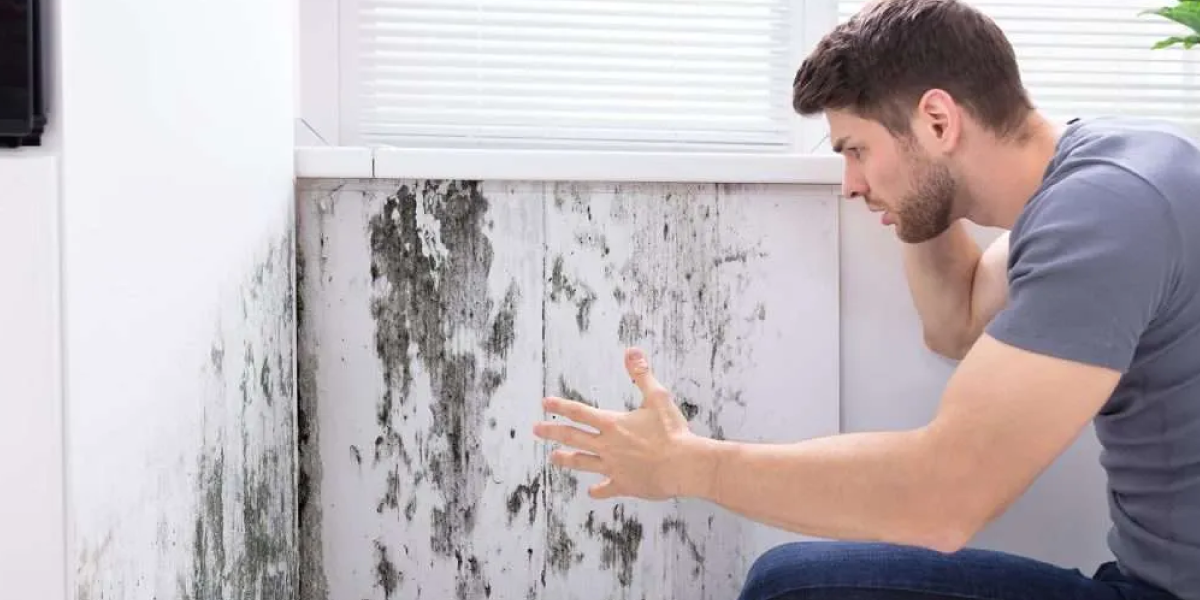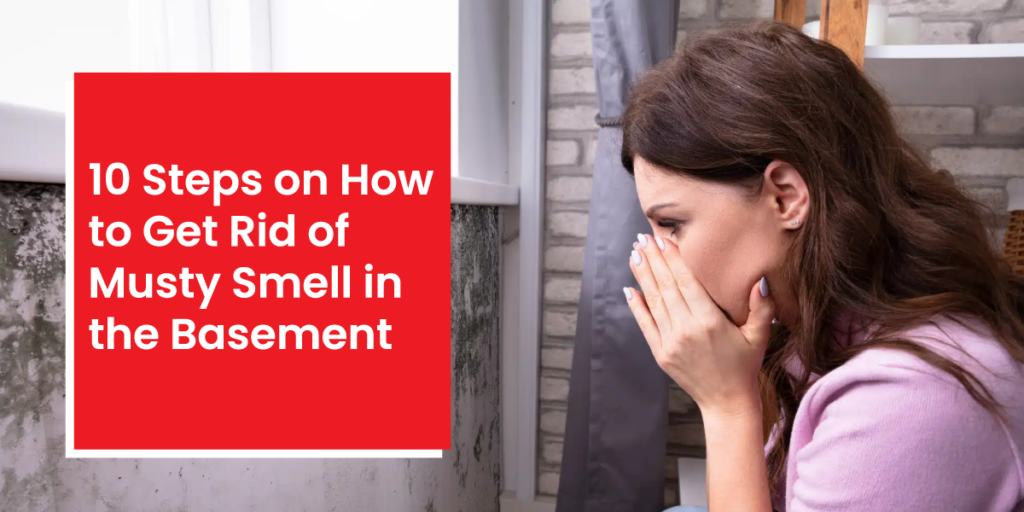A musty smell in the basement is something many of us deal with. It’s not just a bad smell; it usually means there’s too much moisture, poor airflow, or even hidden mold. If you’re wondering how to get rid of musty smell in the basement, this guide is suitable for you.
The best way to get rid of the musty smell in the basement is to find out where it’s coming from, fix any moisture problems, and let fresh air in. Using a dehumidifier and cleaning properly can make a big difference.
In this guide, we’ll walk you through everything in simple steps, like what causes the smell, how to fix it, and how to keep it from coming back for good.
So, What is a Musty Smell and Why Should You Care?
A musty smell in the basement is that damp, old, kind of stuffy smell you notice when you walk into your basement. It usually means there’s moisture hanging around, and sometimes even mold or mildew hiding somewhere.
This smell isn’t just annoying; it’s a sign that something’s wrong. If you ignore it, it can lead to mold spreading, damage to your walls or floor, and even health issues like allergies or breathing problems.
That’s why it’s important to deal with it early instead of waiting for things to get worse.
How to Know If Your Basement Has a Musty Smell
Sometimes the smell is obvious. But sometimes, it sneaks up on you. Here’s how to find out:
| Signs You Have a Musty Basement Smell | What It Means |
| Damp or earthy odor | Mold or mildew is likely growing somewhere |
| Water stains or puddles | There’s a moisture problem or leak |
| Foggy basement windows | Condensation means high humidity |
| Feeling stuffy or hard to breathe | Poor ventilation or mold spores |
| Moldy-smelling carpets or furniture | Upholstery may be holding in odor |
Tip: Check near pipes, behind furniture, in corners, under rugs, and in storage boxes.
If you still smell something odd but can’t see anything, you may want to learn how to test for mold in your house.
What Causes That Musty Smell in Your Basement?
That musty smell in your basement doesn’t just show up for no reason. It’s usually a sign that something’s going wrong down there. Let’s walk you through the most common causes.
- Too much moisture – Since basements are underground, they tend to trap humidity, especially if there’s no proper waterproofing.
- Poor air circulation – If air isn’t moving around, that damp smell just sits there and gets worse over time.
- Mold and mildew – These grow fast in damp, dark places. And once they’re there, they bring that strong musty smell with them.
- Plumbing leaks – A dripping pipe or a hidden leak can cause water to build up in walls or floors without you even noticing.
- Groundwater seepage – If your yard slopes toward your house, rainwater can slowly make its way into the basement and cause dampness.
- Unsealed sump pump – If the sump pump pit is open, it can collect standing water, which starts to smell bad after a while.
- Dry floor drains – When the water in the drain dries out, sewer gases can escape and add to the musty smell.
Also, if your basement had any leaks or flooding before, it’s a good idea to check for mold after water damage.
Now, let’s move on to the details of how to remove the musty smell from the basement.
Step-by-Step: How to Get Rid of Musty Smell in the Basement

Now let’s go over the exact steps you should take to get rid of the smell and make sure it doesn’t come back. Here’s how to remove musty odor in the basement.
1. Find the Source of the Smell
Quick Tip: If you don’t fix the cause, the smell will return no matter what.
Check:
- Behind walls and furniture
- Around plumbing lines
- Near windows and door frames
- Under carpet or flooring
- In the sump pump or floor drain
Pour water in unused drains to refill dry P-traps. Use a flashlight to spot water stains or mold patches.
2. Dry Out the Basement
Moisture is the number one enemy of a fresh basement. Use a dehumidifier to bring down the humidity to 30–50%. You can track humidity using a cheap digital hygrometer.
| Humidity Level | What Happens |
| 30–50% | Safe and healthy |
| 50–60% | Risk of mold |
| Over 60% | Mold and mildew growth likely |
Keep windows closed during humid weather, especially in summer.
3. Improve Ventilation
Fresh air helps get rid of smells faster. Here’s what you can do to improve ventilation.
- Open windows on dry days
- Run box fans or install exhaust fans
- Use your HVAC system to circulate air
- Add vents if the basement is finished.
You can also place a portable air purifier with HEPA and carbon filters to trap odor-causing particles.
4. Clean Every Surface Thoroughly
Deep cleaning removes mold spores and hidden grime. You can use this solution or a basement odor eliminator:
- 1 part white vinegar
- 1 part water
Spray or mop the walls and floors. Scrub moldy areas with a brush. Let dry completely.
For carpets and sofas, rent a steam cleaner or hire a professional. Don’t forget storage boxes or items like books and cardboard. They trap odors, too.
5. Use Natural Odor Absorbers
DIY options can freshen the air quickly.
Try:
- Bowls of baking soda
- Bowls of white vinegar
- Activated charcoal
- Clean cat litter
Place them around the room, especially near corners or under furniture. Change them every few days.
6. Fix Leaks and Seal Cracks
Stop new moisture from entering the basement. Here’s how to do it:
- Patch small wall cracks with waterproof caulk
- Fix any leaky pipes or dripping faucets
- Add insulation around sweating pipes
- Reseal window wells and doorframes
- Keep sump pumps covered and sealed.
If your basement floods, consider regrading your yard or installing a French drain system.
7. Waterproof Your Basement
This is the long-term solution. There are DIY and professional options.
| Waterproofing Method | Purpose |
| Interior sealant | Stops moisture coming through walls |
| Exterior membrane | Blocks water from soil and walls |
| Drain tile system | Directs water to a sump pump |
| Sump pump with battery backup | Removes groundwater, even in power outage |
| Gutter extensions | Sends rainwater away from home |
If the smell or water keeps coming back, call a waterproofing expert for a full inspection.
8. Remove Mold and Mildew (With Caution)
Remove mold and mildew carefully because they’re one of the biggest reasons your basement smells musty. If the moldy area is small, like less than 10 square feet, you can clean it yourself using either bleach or vinegar, but never mix the two because that creates toxic fumes.
Use one or the other with water, scrub the area gently, and let it dry completely. But if the mold covers a bigger space, like more than 3 feet by 3 feet, or it’s hiding behind the walls, or someone in your home has asthma or breathing problems, it’s safer to call a mold removal expert.
That way, the job is done right, and it won’t come back.
When cleaning small mold spots, make sure you use the right bleach-to-water ratio for mold so it’s safe and effective.
9. Keep Up a Regular Cleaning Schedule
Prevention is better than cure.
- Vacuum often (especially pet hair)
- Mop with vinegar water monthly
- Check pipes, windows, and sump pump regularly
- Empty dehumidifier tanks or use a drainage hose
- Deep clean furniture or rugs every few months
10. Let In Light
Sunlight helps kill mold spores and germs. So, keep basement windows clean and open curtains during the day. Make sure windows are sealed tightly to avoid leaks.
Since mold grows fast in damp places, it’s helpful to know how long mold takes to grow so you can act quickly.
Quick Chart: Musty Basement Checklist

| Action | DIY or Pro | Frequency |
| Check humidity | DIY | Weekly |
| Use dehumidifier | DIY | Daily |
| Clean drains and sump pump | DIY | Monthly |
| Inspect for leaks | DIY | Monthly |
| Steam clean carpets | DIY or Pro | Every 3–6 months |
| Seal cracks or install drains | Pro | As needed |
| Mold removal (over 10 sq. ft) | Pro | Immediate |
Wrapping Up: Don’t Let Musty Smells Take Over Your Basement
So, you really don’t have to live with that musty, stinky basement smell anymore. Doesn’t matter if it’s just something small like opening the windows more often or something bigger like fixing drainage or sealing cracks; there’s always a way to fix it. The key is knowing how to get rid of musty smell in the basement and taking action before things get worse.
Just follow the steps we talked about regarding basement odor removal, keep checking things regularly, and don’t wait too long to fix problems. And if something feels too big to handle on your own, it’s totally okay to call a professional.
At the end of the day, your home will feel fresher and cleaner, and your nose will be much happier!
FAQs
|

